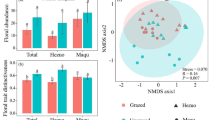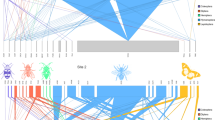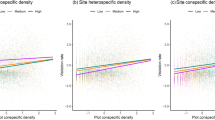Abstract
Facilitation and competition among plants sharing pollinators have contrasting consequences for plant fitness. However, it is unclear whether pollinator-mediated facilitation and competition may affect pollen limitation (potential contribution of pollination to fitness) in pollination networks. Here, we investigated how pollinator sharing affects pollen limitation in a tropical hummingbird-pollinated community marked by facilitation. We employed indices describing how much a plant species potentially affects the pollination of other co-flowering species through shared pollinators (acting degree) and is affected by other co-flowering species (target degree) within the plant–hummingbird network. Since facilitation often increases pollination quantity but not necessarily quality, we expected both indices to be associated with reductions in pollen limitation estimates that depend on pollination quantity (fruit set and seed number) rather than estimates more strictly related to quality (seed weight and germination). We found that both indices were associated with reductions in pollen limitation only for seed weight and germination. Thus, facilitation occurred via qualitative estimates of pollen limitation. Our results suggest that facilitation may enhance plant fitness estimates even if quantitative components of plant fecundity are already saturated. Overall, we showed that pollinator-mediated indirect effects in a multispecies context are important drivers of plant fitness estimates with consequences for coexistence in diverse communities.



Similar content being viewed by others
Availability of data and material
All data and data sources are available in the main text and supplementary material and will be deposited in an appropriate repository.
Code availability
Code will be available in a public repository upon acceptance.
References
Aizen MA, Harder LD (2007) Expanding the limits of the pollen-limitation concept: effects of pollen quantity and quality. Ecology 88:271–281. https://doi.org/10.1890/06-1017
Aizen MA, Rovere AE (2010) Reproductive interactions mediated by flowering overlap in a temperate hummingbird-plant assemblage. Oikos 119:696–706. https://doi.org/10.1111/j.1600-0706.2009.17762.x
Albor C, Arceo-Gómez G, Parra-Tabla V (2020) Integrating floral trait and flowering time distribution patterns help reveal a more dynamic nature of co-flowering community assembly processes. J Ecol 108:2221–2231. https://doi.org/10.1111/1365-2745.13486
Araújo FP, Hoffmann D, Sazima M (2018) The planalto hermit, Phaethornis pretrei—a key species in a Neotropical savanna community in Central Brazil. J Nat Hist 52:37–38. https://doi.org/10.1080/00222933.2018.1536767
Arceo-Gómez G, Barker D, Stanley A, Watson T, Daniels J (2020) Plant-pollinator network structural properties differentially affect pollen transfer dynamics and pollination success. Oecologia 192:1037–1045. https://doi.org/10.1007/s00442-020-04637-5
Ashman T-L, Arceo-Gómez G (2013) Toward a predictive understanding of the fitness costs of heterospecific pollen receipt and its importance in co-flowering communities. Am J Bot 100:1061–1070. https://doi.org/10.3732/ajb.1200496
Ashman T-L, Knight TM, Steets JA, Amarasekare P, Burd M, Campbell DR, Dudash MR, Johnston MO, Mazer SJ, Mitchell RJ, Morgan MT, Wilson WG (2004) Pollen limitation of plant reproduction: ecological and evolutionary causes and consequences. Ecology 85:2408–2421. https://doi.org/10.1890/03-8024
Ashman T-L, Arceo-Gómez G, Bennett JM, Knight TM (2020) Is heterospecific pollen receipt the missing link in understanding pollen limitation of plant reproduction? Am J Bot 107:845–847. https://doi.org/10.1002/ajb2.1477
Barrett SCH (2013) The evolution of plant reproductive systems: how often are transitions irreversible? Proc R Soc B 280:20130913. https://doi.org/10.1098/rspb.2013.0913
Barrett SCH, Harder LD (2017) The ecology of mating and its evolutionary consequences in seed plants. Annu Rev Ecol Evol Syst 48:135–157. https://doi.org/10.1146/annurev-ecolsys-023021
Barton K (2018) MuMIn: multi-model inference. R package version 1.40.4. https://CRAN.R-project.org/package=MuMIn. Accessed 10 Dec 2019
Bartoš M, Janeček Š, Janečková P, Chmelová E, Tropek R, Götzenberger L, Klomberg Y, Jersákova J (2020) Are reproductive traits related to pollen limitation in plants? A case study from a central European meadow. Plants 9:640. https://doi.org/10.3390/plants9050640
Bates D, Maechler M, Bolker B, Walker S (2015) Fitting linear mixed-effects models using lme4. J Stat Softw 67:1–48. https://doi.org/10.18637/jss.v067.i01
Bennet JM, Steets JA, Burns JH, Durka W, Vamosi JC, Arceo-Gómez G, Burd M, Burkle LA, Ellis AG, Freitas L, Rodger JG, Wolowski M, Xia J, Ashman T-L, Knight TM (2018) GloPL, a global data base on pollen limitation of plant reproduction. Sci Data 5:180249. https://doi.org/10.1038/sdata.2018.249
Bergamo PJ, Wolowski M, Maruyama PK, Vizentin-Bugoni J, Carvalheiro LG, Sazima M (2017) The potential indirect effects among plants via shared hummingbird pollinators are structured by phenotypic similarity. Ecology 98:1849–1858. https://doi.org/10.1002/ecy.1859
Bergamo PJ, Wolowski M, Maruyama PK, Vizentin-Bugoni J, Sazima M (2018) Trait patterns across space and time suggest an interplay of facilitation and competition acting on neotropical hummingbird-pollinated plant communities. Oikos 127:1690–1700. https://doi.org/10.1111/oik.05571
Bergamo PJ, Streher NS, Wolowski M, Traveset A, Sazima M (2020) Pollination outcomes reveal negative-density dependence coupled with interspecific facilitation among plants. Ecol Lett 23:129–139. https://doi.org/10.1111/ele.13415
Bergamo PJ, Traveset A, Lázaro A (2021) Pollinator-mediated indirect effects on plant fecundity revealed by network indices. Am Nat 198:734–749. https://doi.org/10.1086/716896
Braun J, Lortie CJ (2019) Finding the bees knees: a conceptual framework and systematic review of the mechanisms of pollinator-mediated facilitation. Perspect Plant Ecol Evol Syst 36:33–40. https://doi.org/10.1016/j.ppees.2018.12.003
Burns JH, Bennett JM, Li J, Xia J, Arceo-Gómez G, Burd M, Burkle LA, Durka W, Ellis AG, Freitas L, Rodger JG, Vamosi JC, Wolowski M, Ashman T-L, Knight TM, Steets JA (2019) Plant traits moderate pollen limitation of introduced and native plants: a phylogenetic meta-analysis of global scale. New Phytol 223:2053–2075. https://doi.org/10.1111/nph.15935
Buzato S, Sazima M, Sazima I (2000) Hummingbird-pollinated floras at three Atlantic forest sites. Biotropica 32:824–841. https://doi.org/10.1111/j.1744-7429.2000.tb00621.x
Canela MBF (2006) Interações entre plantas e beija-flores numa comunidade de Floresta Atlântica Montana em Itatiaia, RJ. Ph.D. Thesis, Universidade Estadual de Campinas, Brasil
Caruso CM (2000) Competition for pollination influences selection on floral traits of Ipomopsis aggregata. Evolution 54:1546–1557. https://doi.org/10.1111/j.0014-3820.2000.tb00700.x
Carvalheiro LG, Biesmeijer JC, Benadi G, Fründ J, Stang M, Bartomeus I, Kaiser-Bunbury CN, Baude M, Gomes SIF, Merckx V, Baldock KCR, Bennett ATD, Boada R, Bommarco R, Cartar R, Chacoff N, Dänhardt J, Dicks LV, Dormann CF, Ekroos J, Henson KSE, Holzschuh A, Junker RR, Lopezaraiza-Mikel M, Memmott J, Montero-Castaño A, Nelson IL, Pteanidou T, Power EF, Rundlöf M, Smith HG, Stout JC, Temitope K, Tscharntke T, Tscheulin T, Vilà M, Kunin WE (2014) The potential for indirect effects between co-flowering plants via shared pollinators depends on resource abundance, accessibility and relatedness. Ecol Lett 17:1389–1399. https://doi.org/10.1111/ele.12342
Dalsgaard B, Maruyama PK, Sonne J, Hansen K, Zanata TB, Abrahamczyk S, Alarcón R, Araujo AC, Araújo FP, Buzato S, Chávez-González E, Coelho AG, Cotton PA, Díaz-Valenzuela R, Dufke MF, Enríquez PL, Filho MMD, Fischer E, Kohler G, Lara C, Las-Casas FMG, Lasprilla LR, Machado AO, Machado CG, Maglianesi MA, Malucelli TS, Marín-Gómez OH, Martínez-García V, Azevedo-Júnior SM, Neto ENS, Oliveira PE, Ornelas JF, Ortiz-Pulido R, Partida-Lara R, Patiño-González BI, Queiroz SNP, Ramírez-Burbano MB, Rech AR, Rocca MA, Rodrigues LC, Rui AM, Sazima I, Sazima M, Simmons BI, Tinoco BA, Varassin IG, Vasconcelos MF, Vizentin-Bugoni J, Watts S, Kennedy JD, Rahbek C, Schleuning M, Martín González AM (2021) The influence of biogeographical and evolutionary histories on morphological trait-matching and resource specialization in mutualistic hummingbird-plant networks. Funct Ecol 35:1120–1133. https://doi.org/10.1111/1365-2435.13784
Dormann CF, Fründ J, Blüthgen N, Gruber B (2009) Indices, graphs and null models: analyzing bipartite ecological networks. Open Ecol J 2:7–24. https://doi.org/10.2174/1874213000902010007
Eisen KE, Wruck AC, Geber MA (2020) Floral density and co-occurring congeners alter patterns of selection in annual plant communities. Evolution 74:1682–1698. https://doi.org/10.1111/evo.13960
González AV, Pérez F (2010) Pollen limitation and reproductive assurance in the flora of the coastal Atacama Desert. Int J Plant Sci 171:607–614. https://doi.org/10.1086/653135
Hedges LV, Olkin I (1985) Statistical methods for meta-analysis. Academic Press, San Diego
Hegland SJ, Totland Ø (2008) Is the magnitude of pollen limitation in a plant community affected by pollinator visitation and plant species specialisation levels? Oikos 117:883–891. https://doi.org/10.1111/j.0030-1299-2008.16561.x
Hervías-Parejo S, Traveset A (2018) Pollination effectiveness of opportunistic Galápagos birds compared to that of insects: from fruit set to seedling emergence. Am J Bot 105:1142–1153. https://doi.org/10.1002/ajb.1122
Hildesheim LS, Opedal HØ, Armbruster WS, Pélabon C (2019) Quantitative and qualitative consequences of reduced pollen loads in a mixed-mating plant. Ecol Evol 9:14253–14260. https://doi.org/10.1002/ece3.5858
Johnson SD, Peter CI, Nilsson LA, Ågren J (2003) Pollination success in a deceptive orchid is enhanced by co-occurring rewarding magnet plants. Ecology 84:2919–2927. https://doi.org/10.1890/02-0471
Knight TM, Steets JA, Vamosi JC, Mazer SJ, Burd M, Campbell DR, Dudash MR, Johnston MO, Mitchell RJ, Ashman T-L (2005) Pollen limitation of plant reproduction: pattern and process. Annu Rev Ecol Evol Syst 36:467–497. https://doi.org/10.1146/annurev.ecolsys.36.102403.115320
Knight TM, Ashman TL, Bennett JM, Burns JH, Passonneau S, Steets JA (2018) Reflections on, and visions for, the changing field of pollination ecology. Ecol Lett 21:1282–1295. https://doi.org/10.1111/ele.13094
Lanuza JB, Bartomeus I, Godoy O (2018) Opposing effects of floral visitors and soil conditions on the determinants of competitive outcomes maintain species diversity in heterogeneous landscapes. Ecol Lett 21:865–874. https://doi.org/10.1111/ele.12954
Lázaro A, Lundgren R, Totland Ø (2015) Pollen limitation, species’ floral traits and pollinator visitation: different relationships in contrasting communities. Oikos 124:174–186. https://doi.org/10.1111/oik.01525
Lázaro A, Gómez-Martínez C, Alomar D, González-Estévez MA, Traveset A (2020) Linking species-level network metrics to flower traits and plant fitness. J Ecol 108:1287–1298. https://doi.org/10.1111/1365-2745.13334
Mead R (1965) A generalised logit-normal distribution. Biometrics 21:721–723. https://doi.org/10.2307/2528553
Merrett MF, Robertson AW, Peterson PG (2007) Pollination performance and vulnerability to pollination breakdown of sixteen native shrub species from New Zealand. NZ J Bot 45:579–591. https://doi.org/10.1080/002882500709509740
Mitchell RJ, Flanagan RJ, Brown BJ, Waser NM, Karron JD (2009) New frontiers in competition for pollination. Ann Bot 103:1403–1413. https://doi.org/10.1093/aob/mcp062
Moeller DA, Geber MA (2005) Ecological contexto of the evolution of self-pollinaton in Clarkia xantiana: population size, plant communities, and reproductive assurance. Evolution 59:786–799. https://doi.org/10.1111/j.004-3820.2005.tb01753.x
Motten AF (1986) Pollination ecology of the spring wildflower community of a temperate deciduous forest. Ecol Monogr 56:21–42. https://doi.org/10.2307/2937269
Müller CB, Adriaanse ICT, Belshaw R, Godfray HCJ (1999) The structure of an aphid-parasitoid community. J Anim Ecol 68:346–370. https://doi.org/10.1046/j.1365-2656.1999.00288.x
Nottebrock H, Schmid B, Mayer K, Devaux C, Esler KJ, Böhning-Gaese K, Schleuning M, Pagel J, Schurr FM (2017) Sugar landscapes and pollinator-mediated interactions in plant communities. Ecography 40:1129–1138. https://doi.org/10.1111/ecog.02441
Parra-Tabla V, Alonso C, Ashman T-L, Raguso RA, Albor C, Sosenski P, Carmona D, Arceo-Gómez G (2021) Pollen transfer networks reveal alien species as main heterospecific pollen donors with fitness consequences for natives. J Ecol 109:939–951. https://doi.org/10.1111/1365-2745.13520
Peralta G, Vázquez DP, Chacoff NP, Lomáscolo SB, Perry GLW, Tylianakis JM (2020) Trait matching and phenological overlap increase the spatio-temporal stability and functionality of plant–pollinator interactions. Ecol Lett 23:1107–1116. https://doi.org/10.1111/ele.13510
Price MV, Waser NM (1982) Experimental studies of pollen carryover: hummingbirds and Ipomopsis aggregata. Oecologia 54:353–358. https://doi.org/10.1007/BF00380004
Ramírez N, Brito Y (1990) Reproductive biology of a tropical palm swamp community in the Venezuelan Llanos. Am J Bot 77:1260–1271. https://doi.org/10.2307/2444587
Rodger JG, Ellis AG (2016) Distinct effects of pollinator dependence and self-incompatibility on pollen limitation in South African biodiversity hotspots. Biol Lett 12:20160253. https://doi.org/10.1098/rsbl.2016.0253
Sargent RD, Ackerly DD (2008) Plant-pollinator interactions and the assembly of plant communities. Trends Ecol Evol 23:123–130. https://doi.org/10.1016/j.tree.2007.11.003
Sargent RD, Otto SP (2006) The role of local species abundance in the evolution of pollinator attraction in flowering plants. Am Nat 167:67–80. https://doi.org/10.1086/498433
Sargent RD, Kembel SW, Emery NC, Forrestel EJ, Ackerly DD (2011) Effect of local community phylogenetic structure on pollen limitation in an obligately insect-pollinated plant. Am J Bot 98:283–289. https://doi.org/10.3732/ajb.1000329
Schupp EW, Jordano P, Gómez JM (2017) A general framework for effectiveness concepts in mutualisms. Ecol Lett 20:577–590. https://doi.org/10.1111/ele.12764
Simmons BI, Beckerman AP, Hansen K, Maruyama PK, Televantos C, Vizentin-Bugoni J, Dalsgaard B (2021) Niche and neutral processes leave distinct structural imprints on indirect interactions in mutualistic networks. Funct Ecol 35:753–763. https://doi.org/10.1111/1365-2435.13736
Stiles FG (1977) Co-adapted competitors: the flowering seasons of humming bird-pollinated plants in a tropical forest. Science 198:1177–1178. https://doi.org/10.1126/science.198.4322.1177
Tur C, Saéz A, Traveset A, Aizen MA (2016) Evaluating the effects of pollinator-mediated interactions using pollen transfer networks: evidence of widespread facilitation in south Andean plant communities. Ecol Lett 19:576–586. https://doi.org/10.1111/ele.12594
Vamosi JC, Knight TM, Steets JA, Mazer SJ, Burd M, Ashman TL (2006) Pollination decays in biodiversity hotspots. Proc Natl Acad Sci USA 103:956–961. https://doi.org/10.1073/pnas.0507165103
Viechtbauer W (2010) Conducting meta-analyses in R with the metafor package. J Stat Softw 36:1–4. https://doi.org/10.18637/jss.v036.i03
Vizentin-Bugoni J, Maruyama PK, Debastiani VJ, Duarte LS, Dalsgaard B, Sazima M (2016) Influences of sampling effort on detected patterns and structuring processes of a Neotropical plant–hummingbird network. J Anim Ecol 85:262–272. https://doi.org/10.1111/1365-2656.12459
Vizentin-Bugoni J, Debastiani VJ, Bastazini VAG, Maruyama PK, Sperry JH (2020) Including rewiring in the estimation of the robustness of mutualistic networks. Methods Ecol Evol 11:106–116. https://doi.org/10.1111/2041.210X.13306
Waser NM (1978) Competition for hummingbird pollination and sequential flowering in two Colorado wildflowers. Ecology 59:934–944. https://doi.org/10.2307/1938545
Wendt T, Coser TS, Matallana G, Guilherme FAG (2008) An apparent lack of prezygotic reproductive isolation among 42 sympatric species of Bromeliaceae in southeastern Brazil. Plant Syst Evol 275:31. https://doi.org/10.1007/s00606-008-0054-7
Wolowski M, Ashman TL, Freitas L (2013a) Community-wide assessment of pollen limitation in hummingbird-pollinated plants of a tropical montane rain forest. Ann Bot 112:903–910. https://doi.org/10.1093/aob/mct140
Wolowski M, Saad CF, Ashman TL, Freitas L (2013b) Predominance of self-compatibility in hummingbird-pollinated plants in the Neotropics. Sci Nat 100:69–79. https://doi.org/10.1007/s00114-012-0995-0
Wolowski M, Ashman TL, Freitas L (2014) Meta-analysis of pollen limitation reveals the relevance of pollination generalization in the Atlantic Forest of Brazil. PLoS ONE 9:e89498. https://doi.org/10.1371/journal.pone0089498
Wolowski M, Carvalheiro LG, Freitas L (2017) Influence of plant–pollinator interactions on the assembly of plant and hummingbird communities. J Ecol 105:332–344. https://doi.org/10.1111/1365-2745.12684
Zapata TR, Arroyo MTK (1978) Plant reproductive ecology of a secondary deciduous tropical forest in Venezuela. Biotropica 10:221–230. https://doi.org/10.2307/2387907
Zuur AF, Ieno EN, Elphic CS (2010) A protocol for data exploration to avoid common statistical problems. Methods Ecol Evol 1:3–14. https://doi.org/10.1111/j.2041-210X.2009.00001.x
Acknowledgements
We thank the Instituto Chico Mendes de Biodiversidade and the Itatiaia National Park for research permit in protected areas (ICMBio/SISBIO nº 58349-1). We also thank MBF Canela for kindly sharing data of plant–hummingbird interactions.
Funding
This work was supported by Fundação de Amparo à Pesquisa do Estado de São Paulo (FAPESP—Grants 2016/06434-0 and 2018/02996-0 to PJB); Conselho Nacional de Pesquisas Científicas (CNPq—Grants 445750/2014-6 and 304794/2018-0 to LF, 436335/2018-2 to MW and 302781/2016-1 to MS); Fundação de Amparo à Pesquisa do Estado do Rio de Janeiro [FAPERJ—Grant 202.775/2018 to LF].
Author information
Authors and Affiliations
Contributions
PJB, MS and MW conceived the study. PJB analysed data and wrote the first draft. All authors contributed critically to the final manuscript.
Corresponding author
Ethics declarations
Conflict of interest
The authors declare they have no conflict of interest.
Ethical approval
Ethics approval was not required according to local legislation.
Consent to participate
Not applicable.
Consent for publication
Not applicable.
Additional information
Communicated by Casey P. terHorst.
Supplementary Information
Below is the link to the electronic supplementary material.
Rights and permissions
About this article
Cite this article
Bergamo, P.J., Freitas, L., Sazima, M. et al. Pollinator-mediated facilitation alleviates pollen limitation in a plant–hummingbird network. Oecologia 198, 205–217 (2022). https://doi.org/10.1007/s00442-021-05095-3
Received:
Accepted:
Published:
Issue Date:
DOI: https://doi.org/10.1007/s00442-021-05095-3




